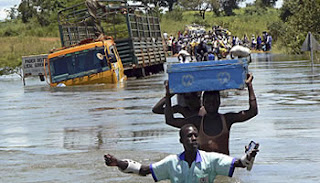On October 20th it was reported that China's growing presence in Africa is becoming very large and seasoned analysts cannot decide whether this booming relationship is good or bad for Africa. Critics are saying that the Chinese's strategy is entirely self-promotional meaning that it is aimed at maintaining access to Africa's precious mineral resources even when that means propping up odious governments. China reports that the Asian superpower is strictly neutral and business-oriented that aims to generate economic growth not a dangerous dependency on aid. As far as Africa's economic growth, China has overall contributed in terms of trade and infrastructure. It has built roads, ports, airports, and more, filling a critical gap that western donors have been shy to provide and unblocking many roads to growth. The rehabilitated 840-mile Benguela rail line for example now connects Angola's coast with the Democratic Republic of Congo and Zambia; while Chinese-financed roads have reduced journey times from Ethiopia's hinterland to the port of Dijibouti facilitating livestock exports. The article then explores in more detail how China contributes to the Africa's economy. In contrast the argument is then made that oil and mining are not labor intensive industries; so even if natural resources are creating impressive headline growth figures, it does not necessarily translate into the spread of job creation. Also without watchful management, oil and mineral revenues have often fueled corruption which has severe negative impacts on a countries development. For example many African's complain that Chinese projects do not employ enough Africans or do enough to transfer skills and technology. The Article then expands on how Africa could use improvement on their policies with Chinese investors and Chinese relations in general.
I chose this article because I thought it was interesting that international investment into Africa has not been decided if it is good or bad at this point. Even though everything looks good on paper there is lingering negative impacts that could potentially hurt the nation. I also chose this article because it ties in with the concept of dependency theory and its history of negative impacts on many of the states in Africa like Nigeria. I think it’s hard to say what is going to happen because even the article is on the fence about the issue. I think it’s great that Chinese Investors are investing in the country with big projects like mining that help add to Africa's economy providing better roads and transportation of goods. But on the other hand it was also explained that many of these projects are not labor intensive and creates little work for Africa's citizens. This would not help poverty rates but it would show better economic statistics for the country as a whole. Since technology and skills are not being passed along, this leads to more dependency of Africa relying on countries like China to take advantage of natural resources to keep the country on its feet. Overall if the presence of China is controlled appropriately it has the potential of expanding enormous opportunity.
In order for this to work properly, I think African countries need to encourage Chinese Investment into more labor intensive sectors. Since Africa's populations are growing at a very fast rate, job creation is very important if it wants to take advantage of the opportunity of foreign investment. African countries also would need better terms with Chinese Investors that include quality control and better linkages with local economies. African governments could urge China to improve market access for African goods overseas, for example the World Trade Organization.
Sources:
"Is China Good or Bad for Africa?" – Global Public Square. N.p., n.d. Web. 31 Oct. 2012. <http://globalpublicsquare.blogs.cnn.com/2012/10/29/is-china-good-or-bad-for-africa/?iref=allsearch>.


